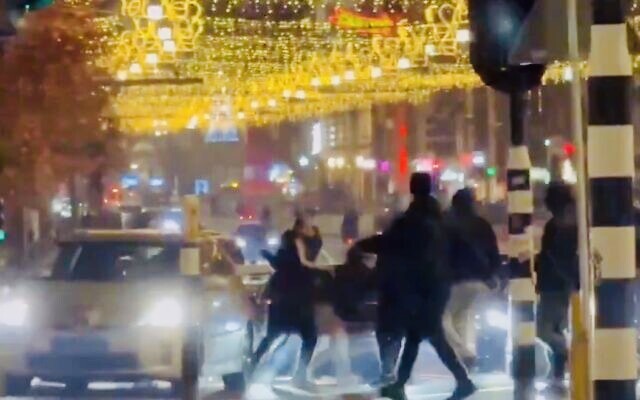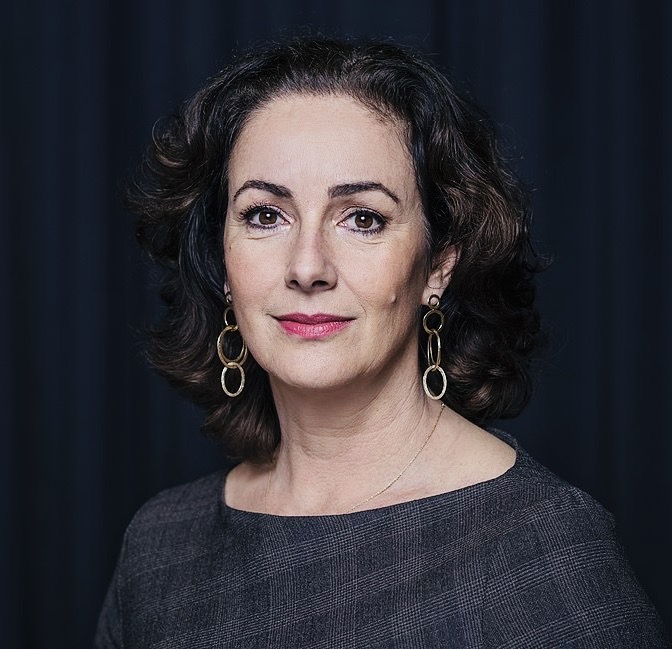With Jews in Europe poised to mark the 85th anniversary of Kristallnacht on November 9, mobs attacked Israeli soccer fans in Amsterdam following a match between Maccabi Tel Aviv and Ajax the night before.
The violence immediately brought to mind an ugly incident that occurred in Makhachkala, the capital of Dagestan, late last October. Shortly after the outbreak of the Israel-Hamas war, Muslim males brandishing Palestinian flags stormed the airport searching for Jews who had just arrived on a flight from Israel. The rioters were apparently galvanized by social media posts disseminating the false rumor that Israelis were settling in Dagestan, a province in Russia.
Beyond the events in Dagestan, the attacks in Amsterdam summoned up images of Kristallnacht, the nation-wide pogrom in Nazi Germany that turned out to be a prelude to the Holocaust.
Certainly, they resonated with German Foreign Minister Annalena Baerbock. In a commentary on X, she wrote, “The images out of Amsterdam are awful and deeply shameful. The outbreak of such violence against Jews breaks all boundaries. There is no justification for this.”
Yet eight decades after Kristallnacht, or the Night of Broken Glass, the contagion of antisemitism is still with us, fanned most recently by the Hamas atrocities of October 7 and Israel’s fierce military response.
Since then, there has been a tremendous and troubling upsurge of antisemitism, which has often been expressed in the guise of anti-Zionism. Hamas supporters around the world have repeatedly called for “globalizing the intifada” amid anti-Israel, anti-Zionist and antisemitic outbursts.
Since October 7, antisemitic incidents in the Netherlands, a nation known for its liberal values, have increased by about 250 percent.
The attacks in Amsterdam on November 8 were reportedly perpetrated by youth gangs from the Dutch Moroccan and Turkish communities.

They underscored three interlocking points.
Liberal immigration policies have allowed millions of Muslims into Europe who do not necessarily share the same values as most Europeans. Radical Islam is a ticking time bomb in Europe that already has exploded in France and Germany. European Jews may have more to fear from radicalized Muslims than from traditional right-wing antisemites.
From a historical perspective, the Amsterdam attacks reminded Dutch Jews of the horrendous interregnum during which the majority of their brothers and sisters perished. While the Netherlands was a safe haven for Jews for centuries, it was a charnel house during the Nazi occupation, which claimed 75 percent of Dutch Jews, the highest death rate in Western Europe.
Acutely cognizant of the Nazi period, King Willem-Alexander of the Netherlands said the Amsterdam riots were reminiscent of “dark and grim times for the Jewish people.” Speaking to Israeli President Isaac Herzog on the morning of November 8, the king acknowledged his country’s abject failure. “We failed the Jewish community of the Netherlands during World War II,” he said, voicing horror and shock. “And last night, we failed again.”
Femke Halsema, the mayor of Amsterdam, said her city had been tarnished by “hateful antisemitic rioters” who hunted down and attacked Israelis in a night of “unbearable” violence that summons up “memories of pogroms.”

She said that men on scooters targeted Israelis, beating and kicking them in “hit-and-run” assaults. “Our city has been deeply damaged. Jewish culture has been deeply threatened. This is an outburst of antisemitism that I hope to never see again.”
By all accounts, scores of Israelis were ambushed by masked assailants who shouted pro-Palestinian slogans as they beat and harassed them. Five Israelis needed hospital treatment.
A clip screened on Israeli television showed an attacker asking a Maccabe Tel Aviv supporter where he was from and assaulting him while shouting “Free Palestine.” In still another clip, an Israeli who had jumped into a canal for his own safety was berated by a man who demanded that he repeat the phrase “Free Palestine.”
The origins of the violence are unclear, but prior to the soccer game, Palestinians say, some Israeli visitors taunted Arabs, lowered and burned a Palestinian flag, and were heard chanting, “We’ll fuck the Arabs” and “Fuck you Palestine.”
Amsterdam police, having arrested 62 suspects and released all but four of them, said they have launched a major investigation. The Dutch prime minister, Dick Schoof, told Prime Minister Benjamin Netanyahu that “the perpetrators will be tracked down and prosecuted.”
Amsterdam’s police chief, Peter Holla, said that Israelis “experienced anxious moments,” were “deliberately attacked,” and some were “outrageously abused.” His top priority is to track down the attackers, he said.
Geert Wilders, whose anti-Islamic party is a member of the federal government, met Israeli Foreign Minister Gideon Saar in Amsterdam. Wilders compared the attacks to a “Jew hunt” and a “pogrom,” expressed shame that “this can happen in the Netherlands,” and lamented that the Netherlands has become the “Gaza of Europe.”
European Jews, particularly in the Netherlands, have taken note of his scathing remarks.
